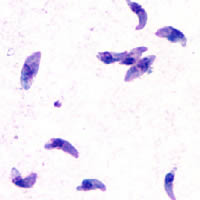For an affluent Western country, the United States has an usually high proportion of its people living in warm-to-tropical climates, which are breeding grounds for parasites.

Schistosomiasis and toxoplasmosis may sound like something you would pick up in a developing country, but the reality is that more and more so-called “third world” parasites are becoming endemic to the United States. Already, some 60 million people — that’s right 60 million — are infected with toxoplasma gondii or, as it’s more fondly known as, the “cat poop parasite.”
But don’t freak out about your pet just yet — it could be worse, and by worse I mean having a tapeworm eat your brain. There have been at least 2,000 cases of neurocysticercosis in the U.S. and 5 million or more cases worldwide, which cause epileptic-like symptoms when this normally gut-eating parasite takes up residence in the cerebrum. There’s also Chagas disease, most commonly found in Latin America, which affects the cardiovascular system and can lead to heart failure. In 2007, U.S. blood banks began screening for the disease and found alarmingly high rates among poor communities in Florida and Texas.
Not only are parasites a public health concern, but also they take an untold toll on human intelligence.
So why are parasites flourishing in the U.S.? For an affluent Western country, the United States has an unusually high proportion of its people living in warm-to-tropical climates, which are breeding grounds for parasites. Moreover, as global warming continues, these parasites find more areas that are amenable to their proliferation. In addition, there is relatively low public awareness about the likelihood of contracting such parasites — malaria happens only in Africa, right?
If parasites aren’t reined in effectively, they not only threaten public health, but also could reduce human capital.
Not only are parasites a public health concern, but also they take an untold toll on human intelligence. Researchers at Johns Hopkins found ACTV-1, a chlorovirus, in two out of every five subjects. Normally found in algae, the pathogen somehow made a rapid evolutionary leap from infecting plant matter to humans and the cost was diminished cognition in those participants who were infected. According to The American Scholar, “When compared with those who did not harbor the virus, those infected were about 10 percent slower to make calculations and had a reduced attention span, suggesting that the virus compromised their ability to calculate, to focus, and to process visual information — disadvantages in the classroom, on the job, and in other familiar learning situations.”
These findings are disturbing on many levels and further reinforce the need for greater access to health care, especially for the nation’s poorest. If parasites aren’t reined in effectively, they not only threaten public health, but also could reduce human capital.
—
Daphne Muller is a New York City-based writer who has written for Salon, Ms. Magazine, The Huffington Post, and reviewed books for ELLE and Publishers Weekly. Most recently, she completed a novel and screenplay. You can follow her on Instagram @daphonay and on Twitter @DaphneEMuller.
Photo courtesy of iStock
(For the source of this article, and to watch videos relating to this subject, please visit: https://bigthink.com/ideafeed/thank-global-warming-for-the-tapeworm-in-your-brain/)








